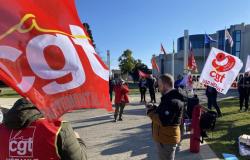In 1995, the Vatican recommended 45 feature films that it described as “important.” Today Aleteia talks to you about “Goodbye Children”, a film by Louis Malle which offers a story of friendship against the backdrop of the Second World War.
During the winter of 1944, Julien, 12 years old, returned to the Collège de Sainte-Croix where he was a boarder. A new friend, Jean, doesn’t seem like the others. Arriving suddenly during the year, with a more discreet character, he is intriguing. Julien ends up making friends with him, gets to know him and discovers that he didn’t arrive at this college entirely by chance. Here we are immersed in the story ofGoodbye childrenfeature film directed by Louis Malle. At the time of its release, in 1987, it achieved no less than 3.5 million admissions in theaters and won a shower of distinctions. But what makes it such a unique work, recommended by the Vatican?
Carelessness in the face of war
What stands out in this feature film is first of all the childhood perspective on the war that surrounds it. When the sirens sound to announce a bombing, the event appears ridiculous. Because maybe daily. The boys take refuge in the basement, unfazed, in the face of a conflict that does not seem to affect them. Director Louis Malle establishes his story in a noisy and abundant climate, in which the mockery and vulgarities of adolescents constantly erupt. In the constant excitement of the playground and the dormitory, the war does not seem to have any influence. This is the vision that brings us Goodbye children. This is what we will do, with another look, Life is beautiful by Roberto Benigni, telling us the story of a father making his son believe that everything that happens in the concentration camp, to which they were deported, is in reality a big game to win a tank ‘assault. So that the war stays at bay and does not tear away the carefreeness of childhood.
But Julien, the hero of the story, breaks this distance with a scathing reply: “It’s only me who thinks about death in this college, it’s incredible!”. He is the one who begins to grow and extricate himself from this carelessness. The character of Jean does not know this distance from the war. Jewish, hidden in the college at the initiative of Father Jean, fear accompanies him “all the time”, making Julien’s previously quoted reply sadly ironic. The film provides a double perspective through these two characters: that of a conflict with a distant threat, and that of a war which frightens us, which we carry within ourselves. The final scene of the feature film marks a turning point for the viewer and for Julien’s character: the end of innocence, childhood marked forever.
Father Jean or discreet heroism
The one who is the discreet heart of the story, who inspired the story, is Father Jean. His presence remains limited on screen, but as he appears, Julien understands what this priest is accomplishing. Despite the fictionalized passages and the different characters invented by the feature film, Father Jean, and everything he accomplishes to protect Jewish children from deportation, is well taken from reality and the true story of Father Jacques de Jesus, bringing to Goodbye children a higher dimension. In addition to these hidden acts of bravery, he appears in the feature film as a priest who makes no concessions, always faithful to the Word in all circumstances. During a homily, he did not hesitate, in front of an essentially bourgeois assembly, to denounce superficial wealth by quoting the epistle of Saint James (Jc 5, 1-2), and to warn of the lack of charity, and this even towards our executioners. The film keeps, through short scenes, our mind alert, in our relationship to the world and in our relationship to our neighbor. The real Father Jacques of Jesus, arrested and deported on January 15, 1944, continued to celebrate the Eucharist and give the sacrament of reconciliation in the camp where he was imprisoned. Resilient, never letting war take hold.
-Director Louis Malle was inspired by his own story to write Goodbye children and tell us about the day his childhood vanished. Day when he understood that heroism can be hidden everywhere, its discretion only making it more striking. He was a student in this college, he saw Father Jacques de Jésus taken away one morning in 1944. Goodbye childrenit is the story of friendship, precious carefreeness and self-sacrifice, emerging from a climate of darkness and incessant noise.
Practical :
Goodbye children by Louis Malle (1987) with Gaspard Manesse, Raphaël Fejtö and Philippe Morier-Genoud.







